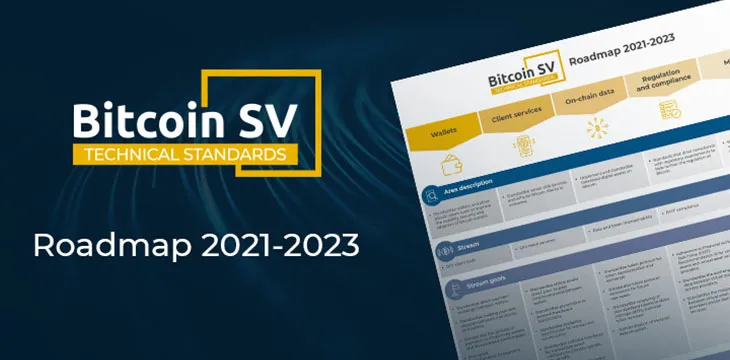|
Getting your Trinity Audio player ready...
|
The Bitcoin SV Technical Standards Committee has released its roadmap for 2021-2023, setting out the priorities for technical standards over the period.
The first of its kind to be published, the roadmap sets out the key priorities of the BSV Technical Standards Committee at a time of rapid growth and adoption of the BSV blockchain worldwide.
The roadmap divides into five specific areas, as decided by the Technical Standards Committee, in order to focus efforts on delivering effective baseline standards for developing with BSV blockchain. The five areas are wallets, client services, on-chain data, regulation & compliance, and mining.
Under each of these technical standards areas, the Bitcoin SV community will collectively decide on the standards, through a process involving working groups, public feedback, review, and user adoption. Through the structure of the committee, the aim is to strive for an inclusive, crowd-sourced set of technical standards that best serve the needs of the BSV ecosystem as it grows to mass global adoption.
The technical standards for wallets will look at the standardization of wallets and other client tools, with a view to making these more secure and practically usable. Strategically the aim is to shape Bitcoin wallets into a format that supports widespread adoption and usage.
Several standards are already in progress for this workflow, including SPV envelope, Merkle proofs, and BIP270, all of which aim to support the goal of standardizing payments between different wallets, providers, and tools.
Client services will see technical standards that aim towards standardizing server side services and APIs. The aim is again greater standardization and interoperability of client services and related tools, including with a focus on security and preventing fraudulent transactions, double spends, and other costly errors. The technical standard for Paymail is already in progress under this workflow at the time the roadmap was published.
On-chain data looks at implementing and standardizing tokenized digital assets on Bitcoin, with envelope specifications currently under consideration. The idea here per the roadmap is to standardize the protocol for exchange and representation of digital assets, as well as standardizing the wrapping of non-standardized tokens for future interoperability.
For regulation and compliance, the roadmap sets out a need for standards to help support further regulation of Bitcoin, including mechanisms for greater FATF compliance. This takes the form in particular of implementing the travel rule, which effectively ends anonymity for digital currency transactions, and makes pseudonymous transactions much more transparent. The call for technical standards around the FATF rules aims to create benchmarks that will ensure compliance in future BSV developments.
On mining, the committee will look at technical standards for assisting miners in commercializing the services they offer, standardizing APIs for interacting with miners, and the exchange of data between different mining entities. Chief among the stream goals is the standardization of data exchange between miners, through the creation of common rules for this subset of the Bitcoin SV ecosystem.
In publishing the roadmap, the TSC said it was looking for interested parties to give their views on the workflow areas and standards as part of the critical public review process.
“In the development of the roadmap, the TSC extended several open invitations for interested stakeholders to submit feedback, which was followed by a public review of the amended roadmap. The stakeholders’ comments and feedback from the public review have defined the final roadmap content and serve as supporting data for the plans and goals that the roadmap details.”
The TSC went on to point out that the roadmap was not static, and would be subject to constant formal review in order to ensure the Bitcoin SV standards set was as up-to-date, innovative, and relevant as required in a fast-growing sector.
“It is important to note that the roadmap is a living document; monitoring and updating the roadmap is essential, with a formal review scheduled to take place every six months. In conjunction with the formal review process, TSC members will, on an ongoing basis, review and reassess the priorities and dependencies of the TSC with a separate matrix document.”
Individuals or companies who have proposals for technical standards are encouraged to come forward with their ideas and to formally submit a proposal for a new technical standard. Because the process is industry-driven and responsive, any stakeholder is welcome to propose new standards, or to apply to get involved with one of the working groups themselves. With minimal time commitment and effort, stakeholders are invited to make contributions to the body of technical standards, which will ultimately set the thresholds and benchmarks for developments built on BSV.
There are several roles available for those interested in getting involved in the work of the technical standards committee. From proposers, who contribute their own unique ideas to help deliver greater utility, through to the authors who pen the technical terms of the standards prior to adoption, Bitcoin Association and TSC are actively encouraging stakeholders to come forward.
There are also roles for reviewers, who cast an eye over proposed technical standards and identify any flaws, before the standards open up to public scrutiny with the review phase.
The current version of the roadmap determines the strategic priorities for the next two years, a critical timescale for the growth of BSV blockchain as it spreads and grows to new developers and users around the world.
Watch: CoinGeek Zurich panel, BSV Technical Standards: Roadmap for an Interoperable Blockchain Future

 07-15-2025
07-15-2025 





